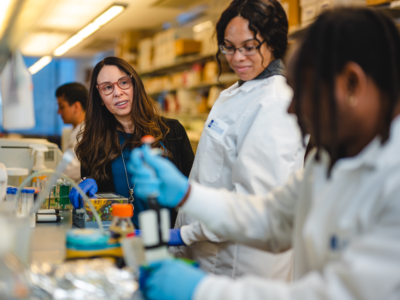Men undergoing radiation therapy for prostate cancer who experience side effects early in treatment may face a higher risk of developing more serious long-term urinary and bowel health issues, according to a study led by investigators from the UCLA Health Jonsson Comprehensive Cancer Center.
A study led by Cedars-Sinai investigators provides evidence that thyroid cancer continues to be overdiagnosed and that aggressive screening and treatment of thyroid cancer has not led to higher survival rates.
The inherited mutated gene WNT9B, which functions normally in embryonic prostate development, increases risk of adult prostate cancer, according to the Vanderbilt University Medical Center study published in JCO Precision Oncology.
Researchers at University of California San Diego have discovered how healthy stem cells are transformed into cancer stem cells in the earliest stages of the disease. The study was published in Nature Communications.
Researchers at Vanderbilt and the University of Michigan have shown that an at-home urine test for prostate cancer screening is highly accurate.
The lab of The Wistar Institute’s Jessie Villanueva has identified a new strategy for attacking treatment-resistant melanoma: inhibiting the gene S6K2. The team published their findings in the paper at the journal Science Translational Medicine.
FDA granted orphan drug designation to MB-105, March Biosciences’s first-in-class CD5-targeted CAR T-cell therapy, for the treatment of relapsed/refractory CD5-positive T-cell lymphoma.
The Committee for Medicinal Products for Human Use of the European Medicines Agency recommended approval of Opdivo (nivolumab) plus Yervoy (ipilimumab) from Bristol Myers Squibb for the first-line treatment of adult patients with unresectable or advanced hepatocellular carcinoma, based on results from the phase III CheckMate-9DW trial. The CHMP opinion will now be reviewed by the European Commission.
CHMP recommended approval of Breyanzi (lisocabtagene maraleucel; liso-cel), a CD19-directed chimeric antigen receptor T-cell therapy, for the treatment of adult patients with relapsed or refractory follicular lymphoma who have received two or more prior lines of systemic therapy.
The National Cancer Institute approved the following clinical research studies last month.






